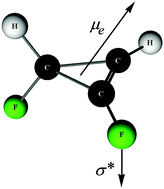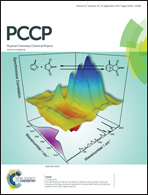A theoretical study of potentially observable chirality-sensitive NMR effects in molecules†
Abstract
Two recently predicted nuclear magnetic resonance effects, the chirality-induced rotating electric polarization and the oscillating magnetization, are examined for several experimentally available chiral molecules. We discuss in detail the requirements for experimental detection of chirality-sensitive NMR effects of the studied molecules. These requirements are related to two parameters: the shielding polarizability and the antisymmetric part of the nuclear magnetic shielding tensor. The dominant second contribution has been computed for small molecules at the coupled cluster and density functional theory levels. It was found that DFT calculations using the KT2 functional and the aug-cc-pCVTZ basis set adequately reproduce the CCSD(T) values obtained with the same basis set. The largest values of parameters, thus most promising from the experimental point of view, were obtained for the fluorine nuclei in 1,3-difluorocyclopropene and 1,3-diphenyl-2-fluoro-3-trifluoromethylcyclopropene.


 Please wait while we load your content...
Please wait while we load your content...